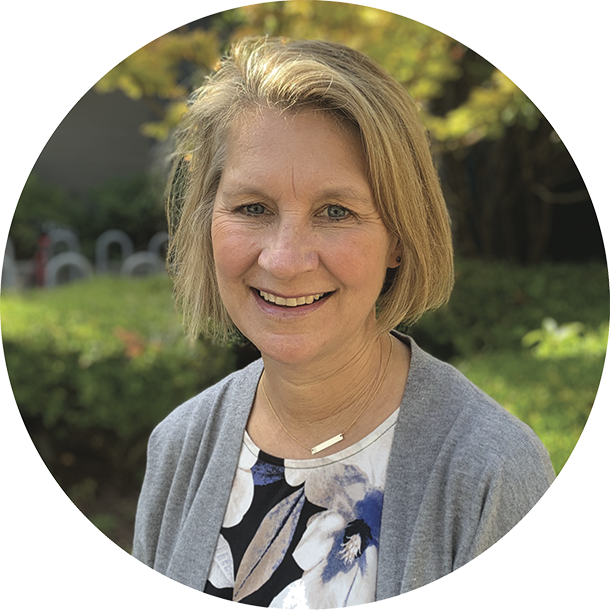Bahaar Sidhu, MBA 13, CFO of Berkeley Partners, empathizes with her evening & weekend MBA classmates, acknowledging, “Haas trained us well for functioning in the COVID-19 pandemic. We all had so much on our plates while we were in school part-time, working full-time, and caring for families, that juggling became second nature.”
At Berkeley Partners, a vertically integrated investment management firm focused on light industrial real estate, Bahaar’s role spans operations and finance, including corporate strategy and portfolio management. She also liaises with transactions, asset management, construction management and property operations, treasury, technology, human resources, and compliance. Previously, Bahaar led the BNY Mellon San Francisco practice and spent seven years at Deutsche Bank in Asset and Wealth Management.
The conversation has been condensed and edited for length.
Real estate has been woven into your career in finance. What about it interests you?
I enjoy the meeting point of real estate and private equity. When you think about product launches, typically consumer products come to mind. But, in real estate private equity, the launch is all about aligning the needs of our institutional investors with the appropriate fund strategies.
The real estate private equity world is quite small, and I’ve been fortunate to work at some great places, from Deloitte to Deutsche Bank to AMB (now Prologis) to BNY Mellon.
Moving to Berkeley Partners was a pivot to a very entrepreneurial firm, which was in the middle of a growth phase having just closed our second institutional value-add fund and a core-plus separate account. It has been a great experience to help lead that transformation. The focus for my first 18 months on the job was on building teams and blueprints for the tech infrastructure, constantly assessing the people and skills sets we needed. The transformation is an iterative process and we continue to focus on our field operations and property management business in the current environment.
When I stepped into the corporate world, I didn’t know what to expect at all. As I’ve grown in my career, I feel responsible to mentor others, to give back what I was given."
How have your leadership skills evolved?
I was 26 when I was hired into a very responsible role at Deutsche, leading a team of people significantly older and more experienced than me. My challenge then was to form relationships based on respect for their expertise, while recognizing my authority in what was a rather formal work environment with a rigid hierarchy.
Berkeley Partners is a much flatter organization with a more fluid environment. Our workforce is quite diverse while employing many millennials, early in their careers. In general, my leadership style is more of a coach, but each relationship is different, according to the individual’s and the team’s needs.
I think Dr. Mark Rittenberg’s Leadership Communications class at Haas influenced my leadership style. He emphasized the importance of authenticity. If you are not authentic, people will not follow you.
I also credit Connie Hardisty, the woman who hired me into that position at Deutsche. She is a no-nonsense leader but one who also exhibits tremendous empathy. She remains one of my most important mentors.
What role do mentors play in leadership development?
I’ve thought a lot about this. My sons, who are eight and five, are growing up in a community where they have advantages I did not have. When I stepped into the corporate world, I didn’t know what to expect at all.
A mentor creates a safe space for you to ask questions and get advice. They go to bat for you. Having a mentor builds confidence and expands your network. As I’ve grown in my career, I feel responsible to mentor others, to give back what I was given.
How well are women represented in the real estate private equity sector?
Not well enough in executive roles. But the tide is beginning to turn. Ten years ago, there were very few female CFOs in the sector. Now there are at least 10 of us that I know personally.
There is approximate equity between men and women at the analyst level, less so for mid- and senior-level executive positions. For that to change, we need to think about how to keep women in the pipeline through transformative life events, like marriage and the birth of children. If anything good comes of this pandemic, perhaps it will be recognition of the effectiveness of flexible work arrangements, which can be tremendously advantageous for working parents.
We need to make conscientious hiring and promotion decisions. Of course, you want the best person for the position, but we need to address and remove the unconscious bias that the best person looks like me.
What advice would you give to women aspiring to leadership positions in business?
Be authentic and know your own worth.
You have to be brutally honest with yourself about your needs and wants. You need to be culturally aligned with the organization where you work. When you’re a strong performer—giving 110%—and the values of the organization, and those of your boss are aligned with yours, your needs and wants tend to be met.
If your organization doesn’t value you, it’s probably time to look for a different role. Don’t wait around for the organization to change; that can take a long time. Sometimes you need to look around and find the right fit where you are valued.
What gives you the greatest satisfaction in your work?
I get the greatest joy in seeing the people that I work with blossom in their own careers, and delivering the best results for our investors. Success isn’t always about AUM growth or reducing the G&A spend. I tell my reports, we’re in a career-long relationship. We may not always work together, but we will weave in and out of each other’s lives.
My Haas classmates are a great example of that. Fifteen or so of us have kept in close contact since graduation, and even meet weekly on a video call. We’ve been there for each other through marriages, children, divorces, the death of parents, and career changes. We’ve done business together. We’ve formed industry-specific cohorts. We’ve helped people get hired and been each other’s recruiters. We’ve even counseled each other’s children! The sense of community with my classmates post-graduation has been one of the most rewarding outcomes of the MBA experience.









